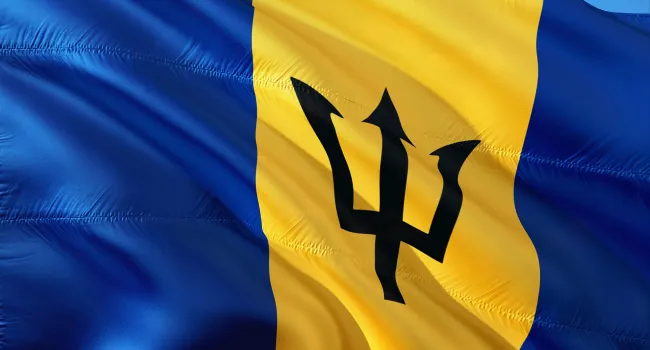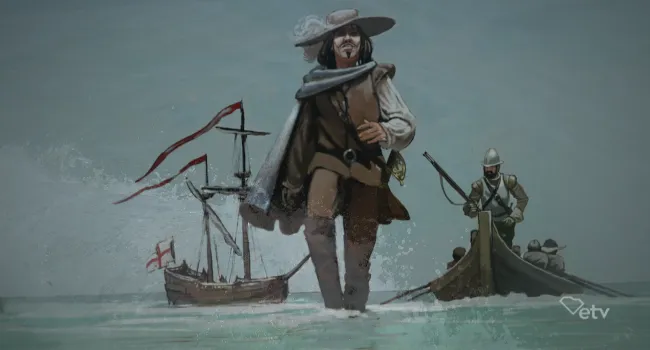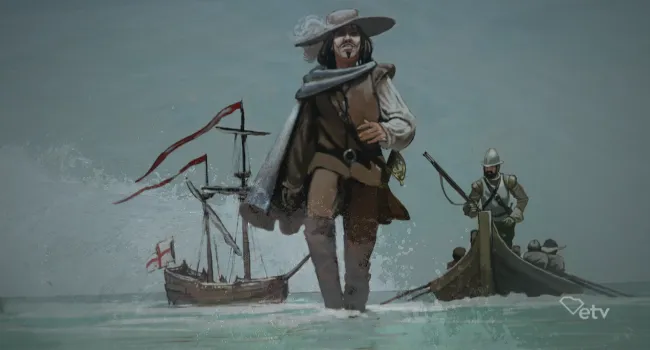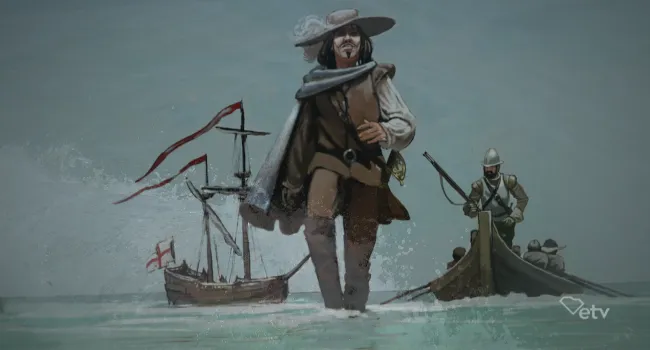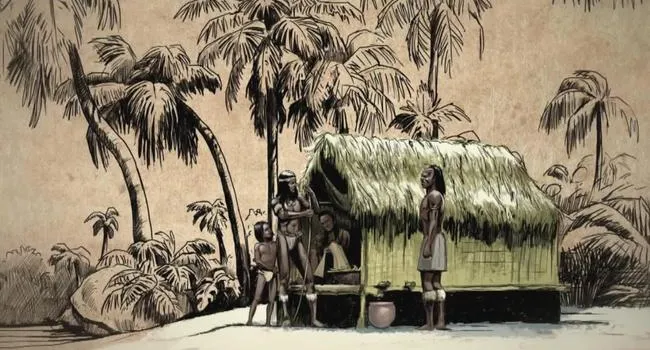Part 1: In the Beginning
Amalgam – A mixture or blend
Amerindians – A member of the indigenous peoples of the Americas
Barbados – An island country in the Lesser Antilles of the West Indies in the Caribbean region of North America
Bearded Fig Trees – The national tree of Barbados and is believed to be the tree from which Barbados’ name came from
Caribbean Trade Routes – Also known as Triangular Trade usually between Africa, Britain, the Caribbean and North America
Commodity – A raw material or primary product that can be bought and sold, such as coffee or copper
Commonwealth – An independent country or community
Coral Rock – A marine limestone that has a variety of fossilized shell and coral embedded in the rock
Equatorial Currents – An ocean current which flows in an east-west direction in the equatorial regions of all the oceans
Geological Uplift – Vertical elevation of the Earth’s surface in response to natural causes
Indentured Servants – A labor system in which people paid for their passage to the New World by working for an employer for a fixed term of years
Indigenous – Originating or occurring naturally in a particular place, native
Land Grant – A grant of public land, especially to an institution, organization, or a particular group of people
Northeast Trade Winds – The prevailing pattern of surface winds from the east toward the west found in the tropics
Surinam – A country on the northeastern coast of South America
United Kingdom – A sovereign country located off the north-western coast of the European mainland
West Indian Islands – The West Indies is a region of the North Atlantic Ocean and the Caribbean that includes the island countries and surrounding waters of three major archipelagos: the Greater Antilles, the Lesser Antilles, and the Lucayan Archipelago
Windward – The side or direction from which the wind is blowing
Part 2: Sweet Success
Corporeal Punishment – Physical punishment such as caning or flogging
Demographic Landscape – The statistical data of a population, especially those showing average age, income, education, and race
Labor Intensive Work – Work that requires a large amount of labor to produce goods or services
Phenotypically – What an individual looks like as a consequence of the interaction of different groups of people and the environment they live in
Sephardic Jews – Jews who follow the customs and traditions of the Jews who lived in the Iberian Peninsula (modern Spain and Portugal) before their expulsion in the late 15th century
Spanish Inquisition – An ecclesiastical court established in Roman Catholic Spain in 1478 and directed originally against converts from Judaism and Islam but later against Protestants, established to act as a tribunal to identify heretics and bring them to justice
Urban Center – A large and densely populated urban area that may include several independent administrative areas
Windmill Technology – A mill that converts the energy of wind into rotational energy by means of vanes called sails or blades
Yellow Fever – A viral disease of typically short duration. In most cases, symptoms include fever, chills, loss of appetite, nausea, muscle pains, and headaches
Part 3: The Barbados Adventurers
Aristocratic – Belonging to or typical of nobility, the upper class
Barbados Adventurers – A group of men who organized and financed an exploratory endeavor to find lumber, fuel sources, and food for Barbados, as well as land for expansion
Captain William Hilton – The leader of an expedition to Port Royal in the Carolina colony to find lumber, fuel sources, and food for Barbados, as well as land for colonization. Hilton Head Island was named after him
Carolina land grants - Grants of public land from King Charles II to Lords Proprietors
Charles Towne – Named after King Charles II. Located off the Ashley River where a group of English settlers landed in 1670 and established what would become the birthplace of the Carolina colony
Commodity – A raw material or primary product that can be bought and sold, such as coffee or copper
Deforestation – Clearance, clearcutting, or clearing is the removal of a forest or stand of trees from land which is then converted to a non-forest use
Dialect – A particular version of a language which is unique to a specific region or social group
Ecological Disaster – A catastrophic event regarding the environment due to human activity
Ecology – The branch of biology that deals with the relations of organisms to one another and their physical surroundings
Exotic – Not native to the place where found, introduced from another country
Expedition – A journey or voyage undertaken by a group of people with a particular purpose, especially that of exploration, scientific research, or war
Extinction – The state or process of disappearing or vanishing
Fortification – A defensive wall or other reinforcement built to strengthen a place against attack
Immunity – The ability of a person to resist a particular infection or toxin
Kiawah – A group of Native Americans belonging to the Cusabo people of the area that became South Carolina
Lord Proprietors – Eight Englishmen to whom King Charles II granted, by the Carolina charters of 1663 and 1665, joint ownership of a tract of land in the New World called “Carolina”
Malaria – A mosquito-borne infectious disease that affects humans and animals. Symptoms include fever, tiredness, vomiting, and headaches
Middletons – Englishmen who came to Barbados in the 1670s and became involved with the illegal slave trade that eventually spread to Carolina
Opulence – Great wealth or luxuriousness
Port Royal – A small fortification near what is now Beaufort, South Carolina
Progeny – The offspring or descendants of a person, usually referring to their children
Rum – An alcoholic beverage distilled from a fermented cane product
Seasoned – Usually referring to an enslaved person who has worked in a hot, humid climate, under harsh conditions for a long time. Those who survived “seasoning” usually had immunity to yellow fever and malaria
Slave Code 1661 – The Barbados slave code marked the beginning of the legal codification (the process of arranging laws or rules according to a plan) of slavery
Temperate – relating to a region or climate that has mild temperatures
Unfettered – Released from restraint or inhibition
Veranda – A usually roofed open gallery or porch attached to the exterior of a building or house
Yellow fever – A disease that is spread by the bite of an infected female mosquito. Symptoms include fever, chills, loss of appetite, nausea, and muscle pains
Part 4: Colony of a Colony
Affluent – Having a great deal of money, wealthy
Aristocrat – A member of the ruling class (aristocracy) or of the nobility
Barbados National Trust – An organization, founded in 1961, which works to preserve and protect the natural and artistic heritage of Barbados
Blackbeard – Edward Teach or Edward Thatch was an English pirate who operated around the West Indies and the eastern coast of Britain’s North American colonies
Defiant – Boldly resisting or challenging
Ethos – The characteristic spirit of a culture or community as shown in its beliefs and aspirations
Gallows – A structure, typically of two uprights and a crosspiece, used to hang criminals
Garrison – The troops stationed in a fortress or town to defend it
George Washington – Traveled to Barbados at age 19 to accompany his half-brother who had tuberculosis. While there he contracted smallpox and observed military operations at the British garrison. Both experiences would later help him save the colonial army and defeat the British in the Revolutionary War
Global Market – An exchange for goods or services that spans national boundaries to encompass the entire world
Goose Creek – A town established on a tributary of the Cooper River and settled by Englishmen from Barbados
Goose Creek Men – Barbadians (former Englishmen) who moved to Southern Carolina and became an important political faction
Hedonistic Culture – A culture devoted to the pursuit of self-gratification and pleasure, governed by a belief that the most important thing in life is to enjoy yourself
Immigrants – People who come to a country to take up permanent residence
Incompetent – Not having or showing the necessary skills to do something successfully
Inoculations – The introduction of a serum or vaccine into the body of a person or animal to produce or boost immunity to a specific disease
Low Country – A geographic and cultural region along South Carolina’s coast, including the Sea Islands once known for its slave-based agricultural wealth in rice and indigo
Parishes – Small administrative districts typically having their own church and a priest or pastor; territorial divisions corresponding to counties in other states
Privateers – Armed ships owned and officered by private individuals holding a government commission and authorized for use in war, especially in the capture of enemy merchant shipping
Revolutionary War – An 18th century war between Great Britain and its thirteen colonies, which won independence and became the United States of America
Rice – A cereal grain that is widely consumed by a large part of the world’s population
Smallpox – An acute contagious disease with fever and pustules that usually leave permanent scars
Stede Bonnet – A wealthy Barbadian plantation owner who left his family to become “The Gentleman Pirate.”
Synonymous – Having the same or nearly the same meaning as another word or phrase
The Battery – A landmark defensive seawall and promenade in Charleston, SC
Triangular Transcontinental Trade – Refers to the trade in the 18th and 19th centuries that involved shipping goods from Britain to West Africa to be exchanged for slaves, these slaves were shipped to the West Indies and exchanged for sugar, rum and other commodities which were in turn shipped back to Britain
Tributary – A river or stream flowing into a larger river or lake
Tuberculosis – An infectious bacterial disease characterized by the growth of nodules in the tissues of the lungs
Unscrupulous – having or showing no moral principles, not honest or fair
Part 5: A Cultural Hearth
Apprenticeship – A person who works for another in order to learn a trade
Bussa’s Rebellion – The first of three major slave uprisings that took place in the British West Indies led by an African born slave named Bussa, who is now regarded as a national hero
Chattel House – A Barbadian word for a small moveable wooden house usually occupied by working class people
Consolidated Slave Law – A compromise law that granted concessions to slaves and the following concessions to slave owners: a white person could kill an enslaved person during a revolt with impunity, capital punishment of any enslaved person who threatened the life of a white person, and all free black people needed to have evidence of their freedom or they are presumed to be enslaved
Coterminous – Having the same boundaries or extent in space, time, or meaning
Creole – A person of mixed European and black descent, especially in the Caribbean
Cultural Hearth – Any place where certain related changes in land-use appear due to human domestication of plants and animals
Cultural Transference – The rethinking and reinterpretation of objects and ideas as they move from culture to culture
Demographics – Statistical data relating to the population and particular groups within it
Emancipation – The process or act of being set free, liberation
Genesis – The origin, start, or point at which something comes into being
Ingenuity – Being clever, original, or inventive
Mimic – Imitate (someone or their actions or words)
Progeny – The offspring or descendants of a person, usually referring to their children
Part 6: From Whence They Came
Accoutrements – Items of dress or equipment carried or worn by a person
Bajan – A native of Barbados
Cuisine – A style or method of cooking, especially as characteristic of a particular country or region
Genealogical Link – The direct descent of an individual or group from an ancestor
Genealogy – The study of families, family history, and the tracing of their lineages
Genteel – Polite, refined, or respectable
Gentrification – The process of making a person or activity more refined or polite
Gullah/Geechee – Descendants of Central and West Africans who came from different ethnic and social groups, a uniquely African American culture
Hoppin’ John – A Black-eyed peas, rice, and ham dish served in the Southern United States
Single House - A form of house found in Charleston, South Carolina. A single house has a narrow side with a gable end along the street. The house is well-suited to the long, narrow lots which were laid out in early Charleston
Transatlantic Slave Trade – The second of three stages of the so-called Triangular Trade involved the transportation of enslaved African people, mainly to the Americas
Vernacular – The language or dialect spoken by the ordinary people in a particular country or region
Standards
- 4.1.E Analyze multiple perspectives on the economic, political, and social developments of British North America and South Carolina.
- 6.3.CE Explain the impact of increased global exchanges on the development of the Atlantic World.
- This indicator was developed to encourage inquiry into the growing interconnectedness between Europe, Africa, and the Americas which led to increased global exchanges throughout the Atlantic World. The indicator also encourages inquiry into the development of human labor systems, cultural interactions, and the growth of economic markets.
- 6.3.CO Compare European motivations for exploration and settlement.
- This indicator was developed to encourage inquiry into European motivations for exploration and settlement as a result of the closing of the Silk Road. This indicator was also written to foster inquiry into the development of the Atlantic World, and the resulting economic, political, and social transformations in European, American, and African societies.
- 8.1.CE Analyze the factors that contributed to the development of South Carolina’s economic system and the subsequent impacts on different populations within the colony.
- This indicator was designed to encourage inquiry into the geographic and human factors that contributed to the development of South Carolina’s economic system. This indicator was also written to encourage inquiry into South Carolina’s distinct social and economic system as influenced by British Barbados.
- 8.1.CX Contextualize the development of South Carolina’s political institutions during the colonization of British North America.
- This indicator was designed to encourage inquiry into the development of the political structure of the South Carolina colony from the development of Charles Towne under English control to the movement toward self-rule.
- 8.1.P Summarize major events in the development of South Carolina which impacted the economic, political, and social structure of the colony.
- This indicator was designed to encourage inquiry into the development of South Carolina as a result of mercantilist policies, which ranged from the Navigation Acts to trade with Native Americans to the use of enslaved people as labor. This indicator was designed to promote inquiry into agricultural development, using the rice-growing knowledge of the enslaved West Africans.
- HG.1.2.PR Explain the cultural, economic, environmental, and political conditions and connections that contribute to human migration patterns.
- HG.3.4.HS Investigate and evaluate the cultural conditions in different regions that play a role in cooperation and conflict over time.
Resources
You need to be logged in to listen to view this content. Create an account now; it's quick, easy, and free!
Log In to View



